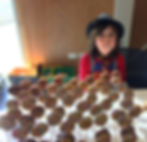Selling Our Handicrafts - and making a profit!
- Carol Palmer
- Oct 5, 2018
- 3 min read

As children move into the third plane of development - usually around the age of twelve - they begin to show an interest in participating in the economic activity of society. To meet this need Montessori adolescent programs run small businesses called 'micro-economies'. Students create a business plan, are given a startup loan and guided through the process of production and sales.
Elementary students are not at this stage of complexity, but are still quite prepared to use their skills to do some fundraising or earn a little extra pocket money. A couple of months ago I saw an advert for a Saturday Children's Craft Market in a neighbouring town. I showed it to my students and asked if anyone was interested in having a stall.
About a dozen children were keen so we began a series of meetings to plan and prepare for the event. At the first meeting, we agreed on the following ground rules:
They could choose to make money for the school or for themselves.
If they were making money for the school, we would cover the stall fees and materials. If they were making money for themselves, they could borrow the money for stall fees and material but pay it back from their takings. If they didn't make the money back, we would write it off.
Each group must have an agreement on how the profits would be divided before they began.
I would support them in the development and creation of products during class time but they could only make products during class time as long as all other required work was done.
They had check with the other groups before introducing a new product to make sure there were no overlaps.
The children came up with a wide range of products from wheat-bags to costume armour to jugging balls. We costed each one out and analysed the cost to profit ratios. The children then rejected some of their initial ideas as not being worth the time and effort and settled on two or three products per group.

Mowgli, my 8 year old son, loves to create things and really wanted to be part of the market but gets so attached to everything he makes that he couldn't bring himself to sell it. Our solution was for him to sell a food product. We cut a few corners here and he made chocolate Oreo-pops - a no-bake winner for a busy mum!

Unfortunately the market had not been very well advertised so whilst there were plenty of stall holders, there were not that many buyers. When it opened, there was an initial flurry as the young stall holders did the rounds, spending their pocket money on each others wares. This lasted about half an hour and then there was a kind of stand off lull, as they were all spent up and no-one else came to do any buying.

When I could bare the painful inactivity no longer, I quietly asked some of the children if there was anything else at the market they would like to buy, if they had more money to spend. They said 'yes'. I asked them if they thought any of the other sellers were in the same position. They said 'probably'. I asked them if there was a way they could all get what they wanted, without exchanging money. They said 'aha!'.

Then one girl picked up some of her wares, bravely went over to another stall and asked if they would like to trade. She returned with an armful of goodies and big grin. This began another flurry as the children all rushed about trading their crafts for anything and everything they could. I'm certain they were not really interested in the goods, the joy came from having someone think their creations were worth exchanging for other goods.

Whilst there are many lessons to be learned here about equivalent value, and some discussions to be had around repayment of investments I feel we met Dr. Montessori's intent for a a micro-economy, “…that something is produced which is useful to the whole society, and that is changed for something else.”
Passers by trickled in for the rest of the afternoon and the children managed to sell enough to feel satisfied with their achievements - particularly the group selling armour, who raised over $100 for the school library. Not bad for first time sellers and most of them are keen to do it again for the Christmas Market.





